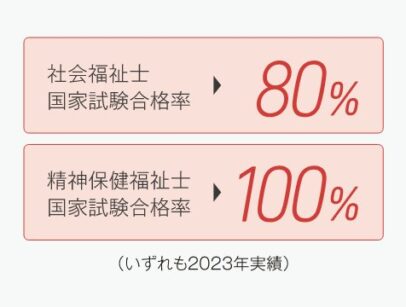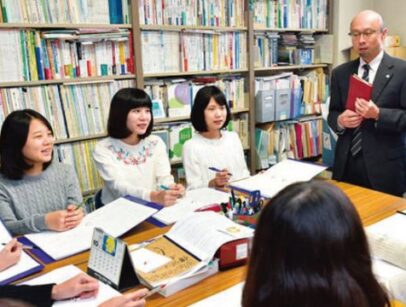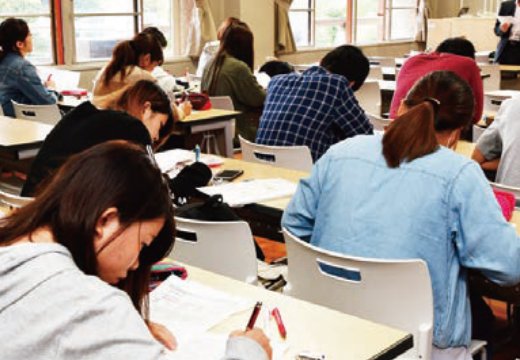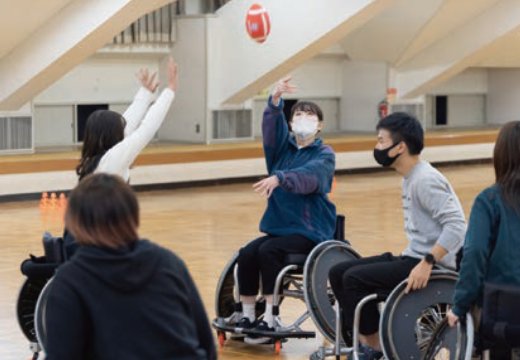Faculty of Humanities Department of Social Welfare Supporting a society where everyone lives happily
English translation in progress. Thank you for waiting.
Contents
Department Overview
This Department is suitable for the following people:
- Those who want to become social workers
- Those who want to study welfare professionally
- Thosewho want to be involved in community welfare activities
Key learning points
01. Aim to become social welfare professionals
The needs for social welfare continue to increase in today’s aging society. The Department trains
social welfare professionals to help realize a society in which everyone can live happily. The
Department is characterized by its small class size and attentive guidance.

02. A high pass rate on national examinations
Every year, we record a high pass rate in the national examinations for social workers and mental
health and welfare workers. The secret to this is our extensive support system. We have a full range of exam preparation courses taught by full-time faculty members, and our strength is our system of being able to provide students with advice and support at any time.
Pass rate for the National Social Worker Examination: 80%
Pass rate for the National Mental Health and Welfare Worker Examination: 100%
(All of the above are actual results for the 2023-2024 academic year)

03. Cultivate the skills necessary for on-site interpersonal support jobs
In “Seminar in Social Work,” students acquire the knowledge, basic attitude, and assistance methods necessary for interpersonal support jobs. In “Practicum in Social Work,” students practice at their field of choice, such as welfare facilities, hospitals, etc., to cultivate their ability to contribute to society.

Enrollment models and qualification models to make the most of your learning for the future
“Social Worker and Mental Health Welfare Worker” Qualification Model
This qualification model is designed for students who are interested in providing direct assistance to the elderly, children, the disabled, and the needy, and who intend to work as social workers at welfare facilities, counseling agencies, and medical institutions, etc. in the future.
- Future vision: social worker
"Community Welfare and Public Administration" enrollment model
This enrollment model is designed for students who are interested in social welfare in general, community welfare, welfare planning, and community development, and who intend to implement welfare activities in government, social welfare councils, various welfare organizations, general companies, and Tenrikyo churches in the future.
- Future vision: Government employees, welfare organization employees and general company employees, etc.
Four-year learning process
First-year
続きを読むAiming for introduction into social welfare
While acquiring a broad range of knowledge from general education subjects, students study in a
lecture format, focusing on departmental subjects that serve as the foundation for social welfare
studies.Representative Classes
 ・Introduction to Social Welfare 1
・Introduction to Social Welfare 1
Understanding diversifying social issues and thinking about "social welfare" for all people means looking at your own life. These lectures provide an opportunity to become actively involved in society.
Second-year
続きを読むLearn interpersonal assistance methods through seminars, etc.
Students will study specialized social welfare subjects in a lecture format and acquire interpersonal assistance methods through “Seminar in Social Work” and other classes.
Representative Classes
 ・Seminar in Social Work 1
・Seminar in Social Work 1
In the seminars, students will gain knowledge about the values and ethics of social welfare, as well as understand and acquire basic interviewing skills. There will also be lectures by guest speakers who are working in the field of social welfare.
Third-year
続きを読むDevelop the knowledge and skills necessary for the profession
Students will take specialized subjects, seminars, and practicum in each program of study. While taking specialized subjects, students will also gain specialized knowledge and skills through practicum based on on-site experience.
Representative Classes
 ・Practicum in Social Work 2
・Practicum in Social Work 2
In principle, students will undertake an internship of at least 180 hours during the summer vacation of their third year at welfare facilities, offices, and medical institutions in the Kansai region for the elderly, disabled, and children.
Fourth-year
続きを読むWrite a graduation thesis and aim to pass the national examination
【Examples of graduation thesis themes】
- Roles and Challenges of Senior Gathering Places in Building Local Communities
高齢者サロンが地域づくりにおいて果たす役割と課題 - Cause of Abuse in Facilities for People with Disabilities and Measures to Prevent it
障がい者施設における虐待の発生原因と防止策について - Support for the Very Elderly in Their Final Stages of Life: To Help Them Live the Final Days as They Desire
超高齢者の終末期における支援 —本人が望む最期を迎えるために— - Research on Preventative Support for Child Abuse
児童虐待の予防支援に関する研究
- Roles and Challenges of Senior Gathering Places in Building Local Communities
Employment Results and Qualifications
Employment Rate
96.6%
※Faculty of Humanities, Social Welfare Major, Actual results for graduates in March 2025
Major employers (information for the most recent 5 years)
Takamatsu Corporation Co., Ltd., Komeda Pharmaceutical Company, Kuretake Co., Ltd.,Sanshodoh Co., Ltd., Aeon Retail Co., Ltd., Mandai Co., Ltd., ITX Japan Corporation, Pressance Corporation, Yamashita, Ltd., Diamond Dining Co., Ltd., UT Care System Co., Ltd., Yoshida Hospital, Kouseikai Takai Hospital, Hearland Shigisan Hospital, Akitsu Kounoike Hospital, Shimizu Hospital, Shodoshima Central Hospital Enterprise Union, Rakuwakai Healthcare System, Koyukai Social Welfare Corporation, Kyoudou Fukushikai Social Welfare Corporation, Seiwakai Social Welfare Corporation, Ikoma Fukushikai Social Welfare Corporation, Osaka Council of Social Welfare, Nara Prefectural Social Welfare Corporation, Kyoto Welfare Association for the Deaf and Speech-Impaired, Osaka Prefecture, Nara Prefecture, Osaka City, Nagoya City, Yamato Takada City, Onomichi City, Sagamihara City, etc. (listed in no particular order)
Available Qualifications
- Social welfare officer (Eligible for national examination)
- Mental health worker (Eligible for national examination)
- Qualification for appointment as a social welfare administrator
- Librarian
- Museum curator
- Japanese language teacher
- Corrections and Rehabilitation
- Missionary of the Tenrikyo church
Faculty list
Curriculum
Curriculum tree(PDF)
Curriculum map(PDF)
Education Policy
Admission Policy
In order to fulfill the educational goals of the Department of Social Welfare, we seek for people with the following qualities:
1. (Knowledge) Those who are interested in various issues of life in modern society.
2. (Skills) Those who can make diversified analysis of everyday problems and are willing to acquire ways to support them.
3. (Thought) Those who have an interest in local and social issues in the context of individual life problems and their solutions.
4. (Attitude) Those who have an interest in the value and ethics of social welfare.
5. (Action) Those who have had experience in actively engaging in sports and cultural activities, and would like to make welfare their profession, or take action as a citizen with a social welfare point of view.
6. (Motivation) Those who have had experience in actively engaging in social activities and extracurricular activities and have an interest in social welfare.Entrance examination methods will take various forms, such as comprehensive selection, special
selection, school recommended selection, general selection, and transfer selection.Curriculum Policy
We systematically distribute subjects that allow students to start out with lectures that teach social welfare, along with theories and methods related to it, then advance to seminars and practicum to learn specific practical methods.
In the first year, students take basic subjects, and in the second, third, and fourth years, they take
advanced subjects and practicum subjects. The curriculum also includes seminars in the third and fourth years for students to prepare a graduation thesis as a summary of their studies.
Also, we offer a curriculum that prepare students to take qualification examinations to become a social worker (national qualification) and mental health worker (national qualification).Diploma Policy
A bachelor’s degree (Social Welfare) will be awarded to students who have acquired the following knowledge and abilities:
1. (Knowledge) Those who accurately understand various issues of life in modern society, and can
acquire the knowledge to analyze those issues.
2. (Skills) Those who can make diversified analysis of everyday problems and have acquired ways to support them.
3. (Thought) Those who can consider local and social issues in the context of individual life problems and their solutions.
4. (Attitude) Those who have acquired the value and ethics of social welfare.
5. (Action) Those who can act as a social welfare professional with practical skills or as a citizen with a welfare perspective.

 ・Introduction to Social Welfare 1
・Introduction to Social Welfare 1 ・Seminar in Social Work 1
・Seminar in Social Work 1 ・Practicum in Social Work 2
・Practicum in Social Work 2